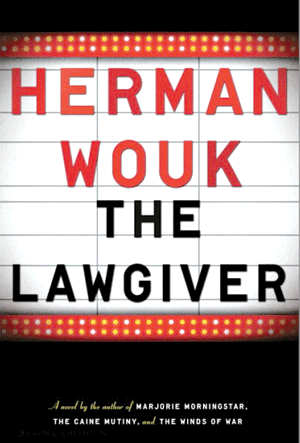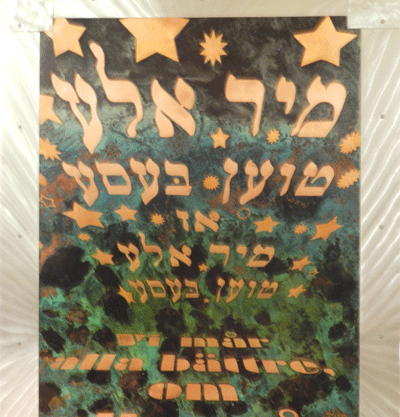Reviewed by NEAL GENDLER
Old sailor Herman Wouk has learned some new knots.
Much is made of Wouk’s writing a novel at age 97, but what’s really noteworthy is the form of his new book, The Lawgiver.
Wouk has been writing all his adult life, from radio comedy in the 1930s to Pulitzer Prize-winning stardom with The Caine Mutiny, drawing on his war years as a deck officer on a destroyer-minesweeper in the Pacific.
He’s also very much a Jewish writer, as with Marjorie Morningstar, and Jewish matters were central in his Winds of War, War and Remembrance and another novel with autobiographical overtones, the captivating Inside, Outside.
Lawgiver, his latest book, is indeed a very novel novel.
Unlike his long, narrative works, Wouk’s Lawgiver engages readers with a super-economy of words — but not of ideas and wit. Wouk tells the story as himself, all as a series of faxes, e-mails, text messages, voicemails, letters, notes, conversation transcripts and memoranda. This takes a bit of getting used to, but after a while, the characters — distinct in style of expression — develop enough to become real.

A novel challenge for readers is remembering to look at the top of the page: The medium by which the messages are conveyed appears above a thin line, which we’re accustomed to seeing as a way to separate page numbers from text.
In Lawgiver, Wouk is about to begin a book he’s wanted to write for half a century: the life of Moses. He’s interrupted by two big-cigar types: Louis Gluck, a religiously observant Australian uranium billionaire, and Hezzie Jacobs, somewhat less rich, who’s working to turn algae into motor fuel. (The idea sounds crazy, but in fact it’s being done.)
Gluck wants to fund a movie about Moses — one more accurate than the Cecil B. DeMille epic starring Charlton Heston — but only if Wouk will write it. He won’t, seeing it as unwanted delay from work on his book. Eventually, and against the advice of BSW, his wife of 63 years — who’s also his (real life) agent, career manager, adviser and no-nonsense gatekeeper — Wouk agrees to read the script. If he approves of it, Gluck will fund the movie.
Writing it has fallen to girl wonder Margolit Solovei, 26, who abandoned the world of Bobover Hasidim for Barnard and a very secular life, creating three art-house movies. She’s almost too smart, witty, beautiful and capable to be believed, but let Wouk have his fun.
He complicates the plot with Hollywood types, an intellectual-property dispute over algae, and the major skepticism of his wife. (The book and its Margo are, in a way, tributes to Betty Sarah Wolk, the Phi Beta Kappa graduate he met while ashore in 1944 and married in 1945.) As in a typical Hollywood product, Wouk adds a romantic subplot. Three of them, in fact, all with Bais Yaakov grads.
The central romance is between Margo and longtime and longing suitor Joshua Lewin, a Yeshiva University graduate not frum enough for her father but now too frum for her. Lewin has become senior partner in an international law firm, and, as Hollywood would have it, he’s Hezzie’s lawyer in the algae dispute. Margo evidently has kept him at arm’s length, but dangling, and she is quick to contact him for counsel on her Hollywood problems.
There’s lots more, and Wouk, a master of complicated plots, twists it all together nicely while he professes exasperation at being dragged in at all.
The plot has an ending my mom calls “only in the movies,” but there’s a jolt in the epilogue, in which Wouk talks directly to the reader.
The Lawgiver is a delightful romp. I hope it was as much fun to write as it is to read.
***
Neal Gendler is a Minneapolis writer and editor.
(American Jewish World, 12.21.12)




















